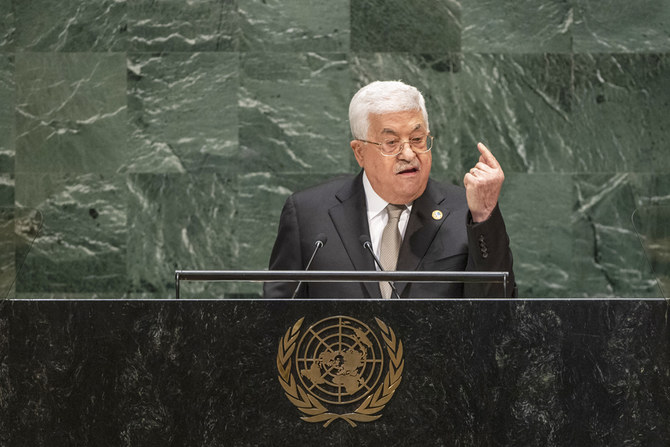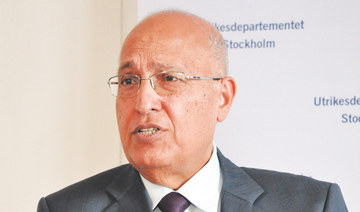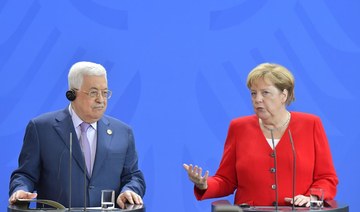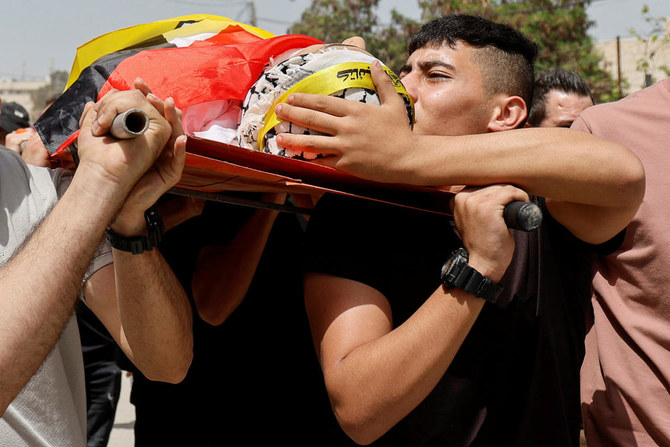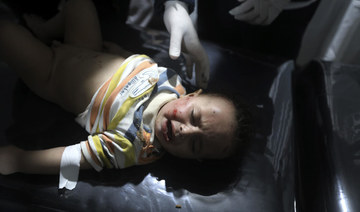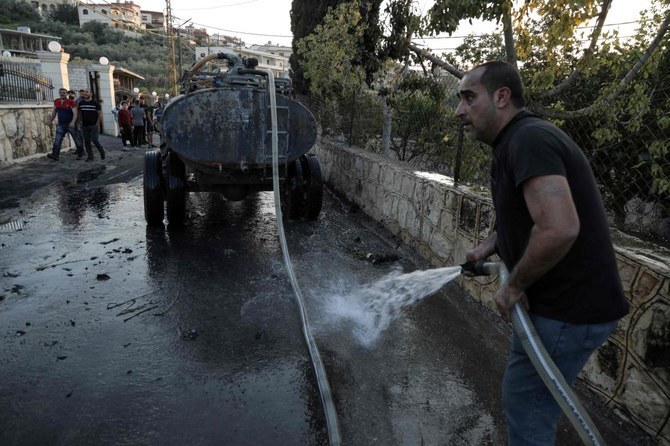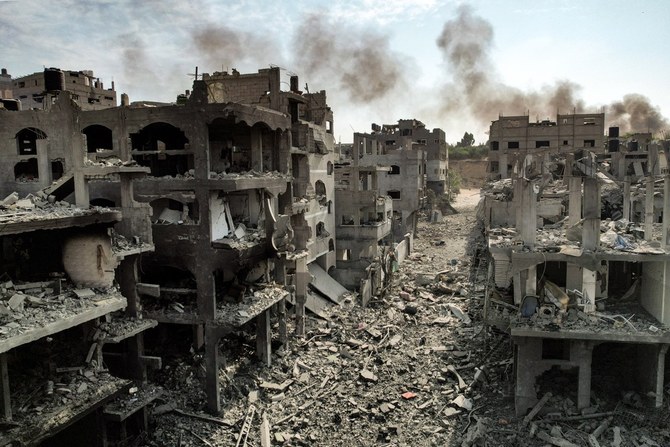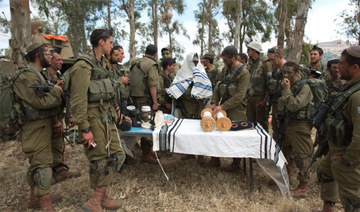NEW YORK: A defiant Palestinian President Mahmoud Abbas told the UN General Assembly on Thursday that Palestine stands ready to negotiate for peace, despite a wave of racism and discriminatory apartheid policies from Israel’s government.
In a separate press briefing, meanwhile, Jordan’s Minister of Foreign Affairs Ayman Safadi brushed aside concerns of “a chill” between Jordan and Israel on the 25th anniversary of the peace agreement between the two countries. However, he restated his concerns about Israel’s actions and said the bilateral agreement is only one part of a comprehensive peace accord that has yet to be signed and must include Palestine.
In his address, Abbas accused Israel of grave breaches of international law and warned that unilateral actions such as the call to annex the West Bank area of the Jordan Valley could have dire consequences.
“It is our right to defend our rights by all possible means, regardless of consequences, while remaining committed to international law and combating terrorism,” Abbas said during a 26-minute speech in Arabic that was interrupted numerous times by applause from General Assembly delegates.
“Our hands will remain extended for peace through negotiations…anything else will be null and void if Israel or any Israeli government led by (Israeli Prime Minister Benjamin) Netanyahu, or any other Israeli leader, will follow this plan he announced…of annexation.”
Abbas, who was accompanied by Palestinian Ambassador to the UN Riyad Mansour, negotiator Saed Erakat and advisers from Palestine’s UN mission, said that when he returns home he will seek to kick-start elections on a local level, in the West Bank, occupied Jerusalem and in the Gaza Strip, where he accused Hamas of seeking to undermine his government.
Only about 20 percent of General Assembly delegates were in the chamber on Thursday before the Palestinian president gave his speech, but many more took their seats when he was introduced and the chamber was more than half full when he spoke. Delegates from Israel and the US were present but not their ambassadors.
#LIVE: #Palestine president Mahmoud Abbas at #UNGA - Our hands remain extended for peace but we will defend our rights at all cost and in line with international law #Israel pic.twitter.com/5TidiByBYf
— Arab News (@arabnews) September 26, 2019
Abbas cited the widespread support Palestine receives from the majority of the UN General Assembly before criticizing the US indirectly for imposing unilateral decisions on the status of occupied Palestinian lands, and calling on the UN to grant Palestine “full member status.” It was granted non-member observer state status in 2012.
“Palestine is a state party to 110 international instruments and organizations,” he said. “Palestine has received the recognition of 140 states from around the world. It is chairing the Group of 77 in China.
“Palestine continues to assume its responsibilities…Palestine deserves to be a full member of the UN…After all we have suffered, we deserve to be a full member. Give me just one reason why we do not deserve to be a full member of the UN?”
Abbas gave details of Israel’s continued violations of international law, and of bullying by withholding funds collected from Palestinian workers and blocking international aid.
“In Jerusalem, the occupying power is waging a reckless, racist war against everything that is Palestinian, from the confiscation, the demolition of homes, to the assaults on clergymen, to the eviction of our citizens from their homes, to attempts to violate the sanctity of the Holy Al-Aqsa Mosque and the Church of Holy Sepulchre, to the legislation of racist laws,” he said.
“Similar laws (to Apartheid) in Israel discriminate against people based on their nationality and their race, and the world remains silent. They deny worshipers access to the holy places, which will lead to dangerous, unfathomable consequences. The results will be a religious war. We want to avoid such a war but Israel is making every effort to reach and wage such a war.”
After stating his firm support for the two-state solution, Abbas mildly ridiculed US President Donald Trump, indirectly, by mocking his much-hyped “deal of the century” for Israeli-Palestinian peace and the favoritism shown by the Trump administration toward Israel.
#LIVE: #Palestine president Mahmoud Abbas at #UNGA - Our hands remain extended for peace but we will defend our rights at all cost and in line with international law #Israel pic.twitter.com/5TidiByBYf
— Arab News (@arabnews) September 26, 2019
“It speaks to the so-called ‘deal of the century’ and peddles elusive solutions…it destroyed all possibilities to achieve peace...it is rejected,” he added to lengthy applause.
Abbas said the US president’s actions have “jeopardized” the two-state solution. The Trump administration recognized Jerusalem as the capital of Israel in December 2017 and moved the US Embassy there in May the following year. It also cut hundreds of millions of dollars in annual aid to the Palestinians, blaming the refusal of the Palestinian Authority to participate in the administration’s peace initiative
“This US policy has emboldened the government of the Israeli occupation to renege all signed agreements with us and its commitments to peace, depriving the peace process of any credibility and pushing large segments of the Palestinian people to lose hope in the possibility of a long-awaited peace. It has jeopardized the two-state solution,” Abbas said. “Now, many wonder if the two-state solution has become impossible. Can we have a one-state solution where everyone can live equally? Some are starting to wonder.”
He added: “I will not accept a one-state solution. I will not accept apartheid. We want a two-state solution based on international legitimacy.”
Abbas also renewed the call for an international peace conference.
“We have never missed an opportunity to hold serious negotiations with the Israeli side,” he said. “We have constructively engaged with all initiatives. They say Palestine does not want peace or negotiations but we say we extend our hands to peace because peace will only be able to be achieved through negotiations and negotiations alone.
“But has Netanyahu ever agreed to negotiations behind closed doors on a bilateral basis, a multilateral basis? He never accepted any negotiations. We have both received several invitations from several countries to meet and start the negotiation process. He has rejected that.”
Abbas went on to denounce terrorism and political violence, specifically referencing the recent attacks on two oil fields in Saudi Arabia that have provoked an international confrontation with Iran.
“We affirm our firm position and condemnation against terrorism,” he said. “We always say we can relinquish anything, but we will never relinquish our fight against terrorism. We have adopted a protocol alongside more than 80 countries to combat terrorism around the world.
“We condemn the recent attacks against the oil facilities in Saudi Arabia. We stand with the Kingdom and we support its decisions and position.”
Jordanian Foreign Minister Safadi echoed many of points made by Abbas and said Jordan has been encouraged by the announcement by many UN members that they will recommit to funding the UN Relief and Works Agency, which provides assistance to Palestinian refugees. He added that political rhetoric from candidates during the recent Israeli campaign that they will annex the Jordan Valley in the occupied West Bank has caused great concern in Jordan.
“The path to a solution is clear,” he said. “Comprehensive peace is a strategic Arab choice. We want a peace to be lasting and to be comprehensive and it has to address the legitimate rights of the Palestinian people.
“We have a peace treaty with Israel…but statements about plans to annex a third of the West Bank will affect the treaty. We are committed to our peace treaty. We are committed to peace. Our region does not need more conflict and more crisis. We remain committed but what we need to look at is the overall picture. The overall picture has not been very promising.
“How do we go forward? How do we create hope? How do we create credible and serious negotiations for the two-state solution? … Lack of progress on the Palestinian front affects all of this. We are committed to peace but peace has to be comprehensive.”
Several heads of state talked at the UN about the need to recognize Palestine and pursue a two-state solution, including Bulgarian President Rumen Radev. He also denounced the rise in antisemitism and proudly described how his country resisted the Nazi persecution of Jews during World War II.



